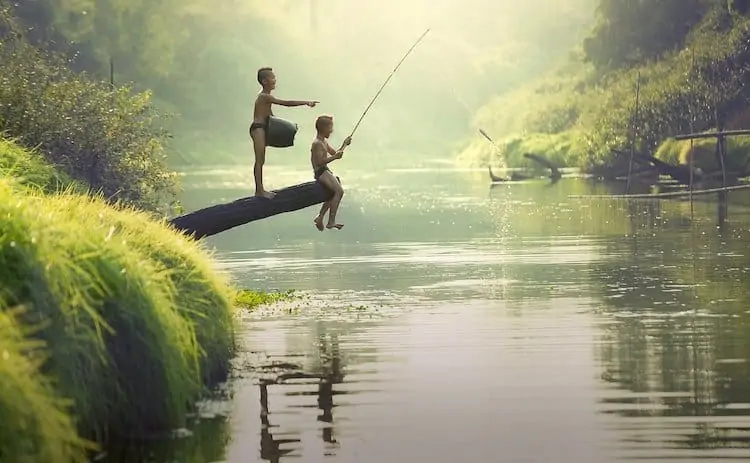Catching carp in rivers tends to require a fisherman to know what he is at. Throwing out a line off any old bank won’t do. So, here are 10 tips for fishing for carp in rivers to help you get the most from your efforts.
Table of Contents
Tips for Fishing Carp in Rivers
 #1. Keenly Evaluate Your Access Options
#1. Keenly Evaluate Your Access Options
It is not easy to find a fishable swim since the common fishing sectors for night fishing tend to be heavily pressured. For the lower pressured swims, they tend to be a lot further away from parking and access roads. It is thus prudent to think twice about what you should pack as well as the length you will have to walk with the gear you have.
#2. Keep Away from Steep Banks
The vast majority of swims tend not to be fishable due to the height of the bank above the water. Moreover, swims with steps or stones that allow access for landing fish are popular and unique. It is thus important to do proper research.
#3. Rig Is Capable of Withstanding the Current
The current plays a critical role in how rigs act and rigs can easily tangle. If you have a standard carp rig, for instance, you probably won’t find any need for it on the river and this will force you to return to the drawing board.
You will also need a considerable amount of lead for holding bottom – swivel leads are without a doubt the best option. If the lead moves in this current, chances are that your very sharp hooks will be ruined thus rendering your rig essentially useless.
#4. Find the Right Line for Snags
Snags can be found everywhere and can slice through your mainline. In addition, they tend to attract freshwater mussels for that extra swift cut. So, our advice is to find the fighting line for handling snags underwater to prevent this sort of an issue from blighting your time fishing for carp.
#5. Be Cautious of Overhanging Trees
While you have to fish close (i.e. less than 1.5m), at 70 yards with different wind conditions, it is usually rather challenging and a lost tackle cannot simply be avoided.
Besides being sufficiently strong, Avid lead clips tend to be incredibly flexible to allow the drop of lead hanging in the branches, and, in most instances, it will allow you to get back the rest of your rig. Don’t forget to take a camping axe which may help you to cut the extra branches of the tree.
#6. Apply Captive Back Leads
Large captive back leads are necessary since there are many barges and large boats on rivers. You should consider using 4.5oz back leads since they seem to cope rather well. Sides are sometimes very steep on rivers and it may take even 4mof retaining line to get them out and down far enough.
You will also require the weight to help you strike the line out of the clip on the take. The back lead and any lighter will lift and hand on the line, which can be dangerous if one is playing a carp. You might think that it is a bit over the top, but the reality is that applying anything else would be a waste of time.
#7. You Have to Pre-Bait
Pre-baiting is undoubtedly critical and it isn’t such a new concept for many. Prior to using any bait to any swim that you fish, many people first catch one to know that they are there.
Unfortunately, that isn’t possible on the river and you have to take a leap of faith and be sure to bait the right way for at least 1 to 2 days before fishing.
#8. Use Bait of the Right Type
Baiting up isn’t always that simple. While it might be dangerous to use a bait boat, it is possible with a safety line and 2 people, 20mm is critical to avoid the attention of large shoals of bream.
While pellets and particles might be quite affordable, you need to use them in moderation. Carp fishing bait spray can be a great addition to your repertoire. Mastering a throwing stick is also critical and it is hard graft to stick out 2kg of 20mm baits.
#9. Beware of Cyclists
If you are fishing a private carp lake, the people you meet during the day will be either bailiffs or fellow anglers. If you are fishing a river, you will also come across dog walkers and cyclists in plenty.
You can be easily and frequently interrupted by either when trying to get your rig back into position and this can make you lose another lead.
#10. Make Many Friends
Making friends is a huge factor when carp fishing on a river, in addition to technical issues, confidence, or the lack of it. You will be very fortunate if you manage to make a new friend, especially one who is a carping professional who can help you catch more fish.
The friends you make will be directly instrumental in helping you bank your first river carp. If you are able to, you need to find someone that can share some of their insight for the particular river that you are targeting.
All of these tips will make your efforts a lot more successful and enjoyable and ensure that your time spent fishing for carp in the river is a more profitable one.
